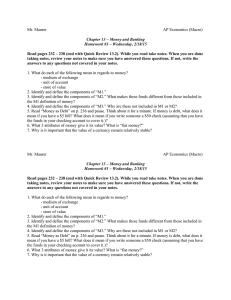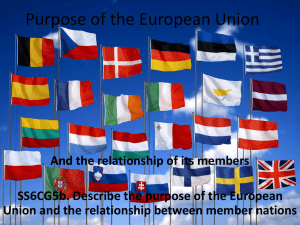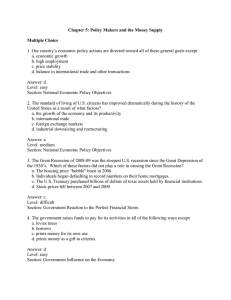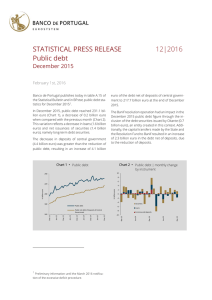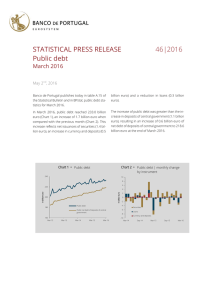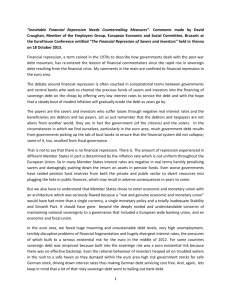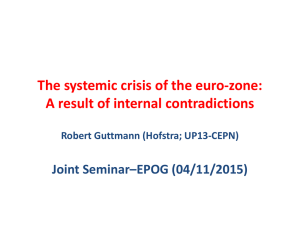Overcoming Crisis in Europe
advertisement
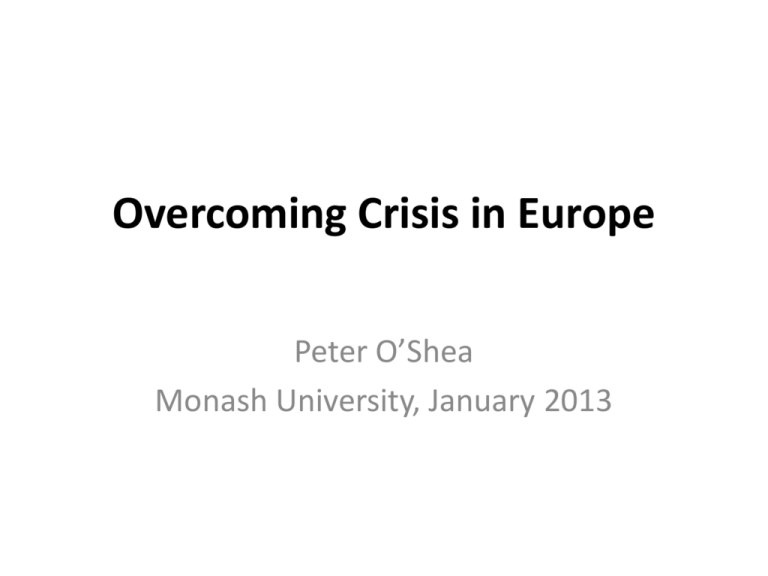
Overcoming Crisis in Europe Peter O’Shea Monash University, January 2013 What Sort of Crisis? • Is it really a euro crisis? It wasn’t a problem when economic growth was strong in mid 2000s. Yet debt was high then. • Slovakia, Germany and Estonia among the eurozone states, with GDP in 2011 above 3%. • Devaluation: exportdependent countries like Germany owe countries like Greece a huge favour Govt, Household, Financial Sector Debt in Largest Economies Source: McKinsey, Q2, 2011 Note: Asset-backed securities are removed from McKinsey data since underlying mortgages and other loans are already included Unity: At what price? • The countries with the biggest deficit problems are Ireland (-13.4%), Greece and Spain (both -9.4%), or the UK (-7.8%). Only Sweden, Hungary and Estonia are in surplus as at October 2011. • Instead it’s a crisis of unity: what price are the wealthier countries willing to pay to have a long-lasting and sustainable peace in Europe? Risk of Default Why the focus on Europe? Because it’s an incomplete union. Why a euro exit is unlikely • The consequences of exit would be far worse • There are other solutions to avoid default since as forced debt writedowns in 2011 and the debt restructuring in 2012 • The EU has deep pockets, such as the collective gold reserves, collective cash reserves, enormous unmobilised private savings reserves throughout the EU but particularly the north • Plus the ECB’s reserves – with long overdue bond buying activity of late The EU’s Policy Response • Financial Stability and Loan Assistance - The Greek Loan Facility - The EFSM & EFSF – soon to be ESM – in Luxembourg (which can be seen from Germany!) - Some facts: no member state has given any funds to the facilities – they are all loans -Money is raised via bonds, guaranteed by states, only in default do states pay up -EFSM funds guaranteed by the EU budget, also IMF funds and some bilateral -You can buy bonds on the Luxembourg stock exchange -No different from lending through EIB or IMF Fiscal Coordination A logical step if union is to complete The Treaty on Stability, Coordination and Governance in the Economic and Monetary Union …. • • • • • • Closer coordination of state fiscal policies Closer Cmn oversight of state budgets Reinforced deficit and debt levels A penalty mechanism Will it work? All based on peer pressure Growth pact and growth targets - Hollande’s re-election? Financial Regulation • Banking supervision overhaul • A big problem earlier identified with the crisis • Regulation of everything from derivatives, directors’ pay, credit ratings agencies, hedge funds, credit default swaps, banking prudential requirements • Ring-fencing of banks – commercial and retail separation – the UK cannot believe the EU is so slow • Moves to banking union – ECB as supervisor and maybe deposit guarantee scheme The Real Problems • Unemployment – no action • A failure to stimulate innovation – R&D funding down, the EIB and EIF require co-financing and prohibit profit • A chronic and long overdue failure to reform welfare and other government spending (excruciatingly slow and seemingly impossible • Anti-business sentiment, particularly in France – manufacturers (and millionaires!) don’t want to go near it for fear of being nationalised • … let alone venture capital firms Tax Havens • HNWIs had hidden $21 trillion of unreported private financial wealth in tax havens in 2010 • The size of the United States and Japanese economies combined !! • Could have generated tax of US$190-280 bn • More than the EU budget for 2012 of €129.1 billion and could chop Greece’s debt in half (total debt $399.3 billion in 2011) EU efforts uncoordinated • The UK versus the EU, with Switzerland in the middle • Liechtenstein, Andorra, San Marino, Monaco … why? • The globalisation of banking and finance, OFCs onbalance sheet assets at US$4.6 trillion • Some so-called legitimate – better regulation, better protection, services etc – but a lot of it is not Tax evasion too • Cost of tax evasion – including avoidance of tax or social security contributions by individuals or companies — $3.1 trillion every year • Addressing these would solve many of the EU’s “financial” and “euro” problems … or those of the less needy A Solution? • Can the EU step back? Does it really want to? Do the people really want to go back to pre-war nation states? • A “structural” overhaul… a constitution with separation of federal and state powers (clear), with the ECJ to adjudicate • Is the popular democratic problem really that insurmountable? … more than half way there • Greater fiscal union, tax independence, cultural independence • Even the UK could join later • … but no more principalities
